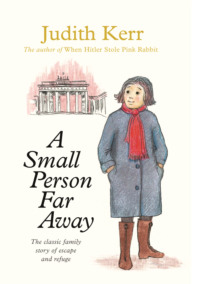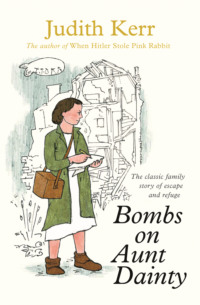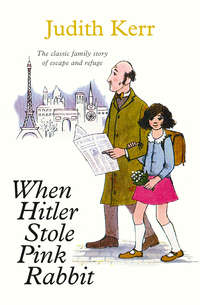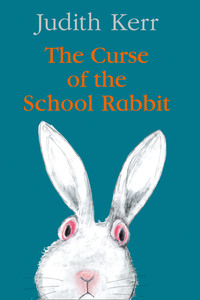
Полная версия
Out of the Hitler Time trilogy: When Hitler Stole Pink Rabbit, Bombs on Aunt Dainty, A Small Person Far Away
“You know!” she said. “You know perfectly well!”
“No, I don’t,” said Anna.
“You do!” said Vreneli.
“No, honestly I don’t!” said Anna. “Please tell me.”
But Vreneli wouldn’t. She walked the rest of the way home without giving Anna a single glance, her nose in the air and her eyes fixed on some distant point. Only when they had reached the inn and were about to separate, did she look at her briefly, and Anna was surprised to see that she was not only angry but nearly in tears.
“Anyway,” Vreneli shouted over her shoulders as she ran off, “anyway, we all saw your knickers!”
During lunch with Mama and Papa Anna was so quiet that Mama noticed it.
“Anything bother you at school?” she asked.
Anna considered. There were two things which had bothered her. One was Vreneli’s extraordinary behaviour and the other was Herr Graupe’s account of the cavemen. She decided that the business about Vreneli was too complicated to explain and said instead, “Mama, did the cavemen really pin their furs together with safety pins?” This produced such a flood of laughter, questions and explanations that they lasted until the end of lunch, and then it was time to go back to school. Vreneli had already left and Anna, feeling a little lonely, went on her own.
The afternoon lesson was singing again with a lot of yodelling which Anna enjoyed, and when it was over she suddenly found the red-haired boy standing in front of her.
“Hello, Anna!” he said boldly. Some of his friends who were with him laughed, and before Anna could answer they had all turned on their heel and marched out of the classroom.
“Why did he say that?” asked Anna.
Roesli smiled. “I think you’re going to have an escort,” she said and added, “Poor Vreneli!”
Anna would have liked to ask her what she meant, but the mention of Vreneli reminded her that she must be quick if she did not want to walk home alone. So she said, “See you tomorrow,” and ran.
There was no sign of Vreneli in the playground. Anna waited for a while, in case she might be in the cloakroom, but she did not appear. The only people in the playground were the red-haired boy and his friends, who also seemed to be waiting for someone. Vreneli must have rushed off early specially to avoid her. Anna went on hoping a little longer, but at last she had to admit to herself that it was no use and set off on her own. The red-haired boy and his friends decided to leave at exactly the same time.
It was less than ten minutes’ walk back to the Gasthof Zwirn and Anna knew the way well. Outside the school gates she turned right and walked down the road. After a few moments she noticed that the red-haired boy and his friends had also turned right outside the school. The road led to a steep path covered in gravel which joined another road and this in turn, after some twists and turns, led to the inn.
It was while Anna was walking down the gravel path that she first began to wonder whether everything was as it should be. The gravel was thick and very loose and her feet made a loud crunching sound at every step. Presently she became aware of similar, more muffled crunchings behind her. She listened to them for a few moments, then glanced over her shoulder. It was the red-haired boy and his friends again. Their shoes were dangling from their hands and they were trudging through the gravel in their bare feet, apparently untroubled by the sharpness of the stones. Even Anna’s brief glance had been enough to show her that they were all watching her.
She walked more quickly and the steps behind her quickened also. Then a little stone bounced off the gravel to one side of her. While she was still wondering where it had come from another little stone hit her leg. She turned round sharply and was just in time to see the red-haired boy pick up a bit of gravel and throw it at her.
“What are you doing?” she shouted. “Stop it!” But he just grinned and threw another bit. Then his friends began to throw some too. Most of it missed her and any stones that did hit her were too small to hurt, but it was horrid just the same.
Then she saw a small bandy-legged boy hardly bigger than herself pick up a whole handful of gravel.
“Don’t you dare throw that at me!” she shouted so fiercely that the bandy-legged boy automatically took a step backwards. He threw the gravel in her direction but deliberately aimed short. Anna glared at him. The boys stood staring back at her.
Suddenly the red-haired boy took a step forward and shouted something. The others took it up in a sort of chant. “An-na! An-na!” they chanted. Then the red-haired boy threw another bit of gravel and hit her squarely on the shoulder. It was too much. She turned and fled.
Down the path, bits of gravel bouncing all round her, peppering her back, her legs. An-na! An-na! They were coming after her. Her feet slipped and slithered on the stones. If only she could get to the road at least they wouldn’t be able to throw gravel at her. And there it was! Lovely smooth, hard asphalt under her feet. An-na! An-na! They were gaining ground. Now they were no longer stopping to pick up gravel they were coming on faster.
Suddenly a large object hurled past her. A shoe! They were throwing their shoes at her! At least they’d have to stop to pick them up. She rounded a bend and could see the Gasthof Zwirn at the end of the road. The last bit was downhill and she almost threw herself down the slope as with one final effort she reached the courtyard of the inn.
“An-na! An-na!” Boys right behind her, shoes raining all round …And there, like a miracle, like an avenging angel, was Mama! She shot out of the inn like a torpedo. She grabbed the red-haired boy and slapped him. She hit another one with his own shoe. She flung herself into the group and scattered them. All the time she was shouting, “Why are you doing this? What’s the matter with you?” That was what Anna wanted to know too.
Then she saw that Mama had got hold of the bandy-legged boy and was shaking him. All the rest had fled.
“Why did you chase her?” Mama was asking. “Why did you all throw things at her? What had she done?”
The bandy-legged boy scowled and wouldn’t say.
“I won’t let you go!” said Mama. “I won’t let you go until you tell me why you did it!”
The bandy-legged boy looked hopelessly at Mama. Then he blushed and mumbled something.
“What?” said Mama.
Suddenly the bandy-legged boy grew desperate.
“Because we love her!” he shouted at the top of his voice. “We did it because we love her!”
Mama was so surprised that she let go of him and he shot away from her, across the courtyard and away down the road. “Because they love you?” said Mama to Anna. Neither of them could understand it. But when, later, they consulted Max he did not seem very surprised.
“It’s what they do here,” he said. “When they’re in love with anyone they throw things at them.”
“But, good heavens, there were six of them!” said Mama. “Surely there must be other ways for them to express their love!”
Max shrugged. “It’s what they do,” he said and added, “Really Anna should feel honoured.”
A few days later Anna saw him in the village, throwing unripe apples at Roesli.
Max was very adaptable.
Anna was not too sure about going back to school next day. “Suppose they’re still in love with me today?” she said. “I don’t want to have more things thrown at me.”
But she need not have worried. The boys had been so terrified by Mama that none of them dared so much as look at her. Even the red-haired boy kept his eyes carefully averted. So Vreneli forgave her and they were friends as before. Anna even managed to persuade her to try one cartwheel, secretly in a corner at the back of the inn. But in public, at school, they both stuck strictly to hopscotch.
Chapter Eight
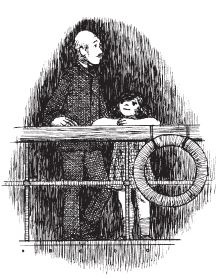
On Anna’s tenth birthday Papa was invited on an outing by the Zurich Literary Society, and when he mentioned Anna’s birthday they invited her and Max and Mama as well. Mama was delighted.
“How lucky that it should just be on your birthday,” she said. “What a lovely way to celebrate.”
But Anna did not think so at all. She said, “Why can’t I have a party as usual?” Mama looked taken aback.
“But it’s not the same as usual,” she said. “We’re not at home.”
Anna knew this really, but she still felt that her birthday ought to be something special for her – not just an outing in which everyone else was included. She said nothing.
“Look,” said Mama, “it’ll be lovely. They’re going to hire a steamer, just for the people on the outing. We’re going nearly to the other end of the lake and having a picnic on an island, and we won’t be home till late!” But Anna was not convinced.
She did not feel any better when the day arrived and she saw her presents. There was a card from Onkel Julius, some crayons from Max, a small pencil box and a wooden chamois from Mama and Papa. That was all. The chamois was very pretty, but when Max was ten his birthday present had been a new bicycle. The card from Onkel Julius had a picture of a monkey on it and he had written on the back in his meticulous handwriting, “A happy birthday, and many more even happier ones to come.” Anna hoped he was right about the birthdays to come, because this one certainly did not look very promising.
“It’s a funny sort of birthday for you this year,” said Mama, seeing her face. “Anyway you’re really getting too big to bother much with presents.” But she hadn’t said that to Max when he was ten. And it wasn’t as though it were just any birthday, thought Anna. It was her first birthday with double figures.
As the day wore on she felt worse and worse. The outing was not really a success. The weather was lovely but it became very hot on the steamer and the members of the literary society all talked like Fräulein Lambeck. One of them actually addressed Papa as “dear Master”. He was a fat young man with lots of small sharp teeth, and he interrupted just as Anna and Papa were starting a conversation.
“I was so sorry about your article, dear Master,” said the fat young man.
“I was sorry too,” said Papa. “This is my daughter Anna who is ten today.”
“Happy birthday,” said the young man briefly and at once went back to talking to Papa. It was such a pity that he hadn’t been able to print Papa’s article, especially as it was so splendid. The young man had admired it enormously. But the dear Master had such strong opinions …the policy of the paper …the feelings of the government …the dear Master must understand.
“I understand entirely,” said Papa, turning away, but the fat young man held on.
Such difficult times, said the young man. Fancy the Nazis burning Papa’s books – Papa must have felt terrible. The young man knew just how terrible Papa must have felt because as it happened he had just had his own first book published and could imagine …Had the dear Master by any chance seen the young man’s first book? No? Then the young man would tell him about it …
He talked and talked with his little teeth clicking away and Papa was too polite to stop him. At last Anna could stand it no longer and wandered off.
The picnic, too, proved a disappointment. It consisted largely of bread rolls with rather grown-up fillings. The rolls were hard and a bit stale so that only the fat young man with the teeth, thought Anna, could have chewed his way through them. For drink there was ginger beer which she hated but Max liked. It was all right for him. He had brought his fishing rod and was quite content to sit on the edge of the island and fish. (Not that he caught anything – but then he was using bits of stale rolls for bait and it was not surprising that the fish did not like them either.)
There was nothing for Anna to do. There were no other children to play with and after lunch it was even worse because there were speeches. Mama had not told her about the speeches. She should have warned her. They went on for what seemed like hours and Anna sat through them miserably in the heat, thinking of what she would have been doing if they had not had to leave Berlin.
Heimpi would have made a birthday cake with strawberries. She would have had a party with at least twenty children and each of them would have brought her a present. About now they would all be playing games in the garden. Then there would be tea, and candles round the cake …She could imagine it all so clearly that she hardly noticed when the speeches finally came to an end.
Mama appeared beside her. “We’re going back to the boat now,” she said. Then she whispered, “The speeches were dreadfully dull, weren’t they?” with a conspiratorial smile. But Anna did not smile back. It was all very well for Mama – after all it wasn’t her birthday.
Once back on the boat she found a place by the side and stood there alone, staring into the water. That was it, she thought as the boat steamed back towards Zurich. She’d had her birthday – her tenth birthday – and not a single bit of it had been nice. She folded her arms on the railings and rested her head on them, pretending to look at the view so that no one should see how miserable she was. The water rushed past below her and the warm wind blew through her hair, and all she could think of was that her birthday had been spoilt and nothing would ever be any good again.
After a while she felt a hand on her shoulder. It was Papa. Had he noticed how disappointed she was? But Papa never noticed things like that – he was too absorbed in his own thoughts.
“So now I have a ten-year-old daughter,” he said and smiled.
“Yes,” said Anna.
“As a matter of fact,” said Papa, “I don’t think you are quite ten years old yet. You were born at six o’clock in the evening. That’s not for another twenty minutes.”
“Really?” said Anna. For some reason the fact that she was not quite ten yet made her feel better.
“Yes,” said Papa, “and to me it doesn’t seem so very long ago. Of course we didn’t know then that we’d be spending your tenth birthday steaming about Lake Zurich as refugees from Hitler.”
“Is a refugee someone who’s had to leave their home?” asked Anna.
“Someone who seeks refuge in another country,” said Papa.
“I don’t think I’m quite used to being one yet,” said Anna.
“It’s an odd feeling,” said Papa. “You live in a country all your life. Then suddenly it is taken over by thugs and there you are, on your own in a strange place, with nothing.”
He looked so cheerful as he said this that Anna asked, “Don’t you mind?”
“In a way,” said Papa. “But I find it very interesting.”
The sun was sinking in the sky. Every so often it disappeared behind the top of a mountain, and then the lake darkened and everything on the boat became dull and flat. Then it reappeared in a gap between two peaks and the world turned rosy-gold again.
“I wonder where we’ll be on your eleventh birthday,” said Papa, “and on your twelfth.”
“Won’t we be here?”
“Oh, I don’t think so,” said Papa. “If the Swiss won’t print anything I write for fear of upsetting the Nazis across the border we may as well live in another country altogether. Where would you like to go?”
“I don’t know,” said Anna.
“I think France would be very nice,” said Papa. He considered it for a while. “Do you know Paris at all?” he asked.
Until Anna became a refugee the only place she had ever gone to was the seaside, but she was used to Papa’s habit of becoming so interested in his own thoughts that he forgot whom he was talking to. She shook her head.
“It’s a beautiful city,” said Papa. “I’m sure you’d like it.”
“Would we go to a French school?”
“I expect so. And you’d learn to speak French. On the other hand,” said Papa, “we might live in England – that’s very beautiful too. But a bit damp.” He looked at Anna thoughtfully. “No,” he said, “I think we’ll try Paris first.”
The sun had now disappeared completely and it was dusk. It was hard to see the water as the boat sped through it, except for the foam which flashed white in what little light was left.
“Am I ten yet?” asked Anna. Papa looked at his watch.
“Ten years old exactly.” He hugged her. “Happy, happy birthday, and very many happy returns!”
And just as he said it the boat’s lights came on. There was only a sprinkling of white bulbs round the rails which left the deck almost as dark as before, but the cabin suddenly glowed yellow and at the back of the boat the ship’s lantern shone a brilliant purply-blue.
“Isn’t it lovely!” cried Anna and somehow, suddenly, she no longer minded about her birthday and her presents. It seemed rather fine and adventurous to be a refugee, to have no home and not to know where one was going to live. Perhaps at a pinch it might even count as a difficult childhood like the ones in Gunther’s book and she would end up by being famous.
As the boat steamed back to Zurich she snuggled up to Papa and they watched the blue light from the ship’s lantern trailing through the dark water behind them.
“I think I might quite like being a refugee,” said Anna.
Chapter Nine
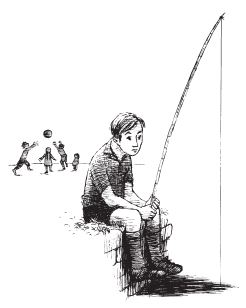
The summer wore on and suddenly it was the end of term. On the last day there was a celebration at school with a speech by Herr Graupe, an exhibition of needlework by the girls, a gym display by the boys and much singing and yodelling by everyone. At the end of the afternoon each child was presented with a sausage and a hunk of bread, and they wandered home through the village chewing and laughing and making plans for the next day. The summer holidays had begun.
Max did not finish until a day or two later. At the High School in Zurich the term did not end with yodelling and sausages but with reports. Max brought home his usual quota of comments like, “Does not try” and “Shows no interest”, and he and Anna sat through the usual gloomy lunch while Mama and Papa read them. Mama was particularly disappointed because, while she had got used to Max not trying and showing no interest in Germany, she had somehow hoped it might be different in Switzerland – because Max was clever, only he did not work. But the only difference was that whereas in Germany Max had neglected his work to play football, in Switzerland he neglected it in order to fish, and the results were much the same.
It was amazing, thought Anna, how he went on with his fishing even though he never caught anything. Even the Zwirn children had begun to tease him about it. “Bathing worms again?” they would say as they passed him and he would scowl at them furiously, unable to shout an insult back for fear of disturbing some fish that might just be going to bite.
When Max was not fishing he and Anna and the three Zwirn children swam in the lake and played together or went for walks in the woods. Max got on well with Franz, and Anna had become quite fond of Vreneli. Trudi was only six, but she trailed along behind no matter what the others were doing. Sometimes they were joined by Roesli and once even by the red-haired boy who studiously ignored both Anna and Vreneli and only talked about football to Max.
Then one morning Anna and Max came down to find the Zwirn children playing with a boy and a girl they had never seen before. They were German, about their own ages, and were spending a holiday with their parents at the inn.
“Which part of Germany do you come from?” asked Max.
“Munich,” said the boy.
“We used to live in Berlin,” said Anna.
“Gosh,” said the boy, “Berlin must be marvellous.”
They all played chase together. It had never been much fun before because there had only been four of them – (Trudi did not count because she could not run fast enough and always cried when anyone caught her). But the German children were both very quick on their feet and for the first time the game was really exciting. Vreneli had just caught the German boy, and he caught Anna, so now it was Anna’s turn to catch someone and she chased after the German girl. They raced round and round the courtyard of the inn, doubling back and forth and leaping over things until Anna thought she was just going to catch her – but all at once her path was blocked by a tall thin lady with a disagreeable expression. The lady appeared so suddenly, apparently from nowhere, that Anna was barely able to stop and almost collided with her.
“Sorry,” she said, but the lady did not reply.
“Siegfried!” she called shrilly. “Gudrun! I told you you were not to play with these children!” She grabbed hold of the German girl and pulled her away. The boy followed, but when his mother was not looking he made a funny face at Anna and waved his hands apologetically. Then the three of them disappeared into the inn.
“What a cross woman,” said Vreneli.
“Perhaps she thinks we’re badly brought up,” said Anna.
They tried to go on playing chase without the German children, but it was no good and ended in the usual shambles, with Trudi in tears because she had been caught.
Anna did not see the German children again until the late afternoon. They must have been shopping in Zurich for they were each carrying a parcel and their mother had several large ones. As they were about to go into the inn Anna thought this was her chance to show that she was not badly brought up. She leapt forward and opened the door for them.
But the German lady did not seem at all pleased. “Gudrun! Siegfried!” she said and pushed her children quickly inside. Then, with a sour expression and keeping as far away from Anna as possible, she squeezed past herself. It was difficult because of the parcels which nearly stuck in the doorway, but at last she was through and disappeared. With never a word of thanks thought Anna – the German lady was badly brought up herself!
The next day she and Max had arranged to go up into the woods with the Zwirn children, and the day after that it rained, and the day after that Mama took them to Zurich to buy them some socks – so they did not see the German children. But after breakfast on the following morning when Anna and Max went out into the yard, there they were again playing with the Zwirns. Anna rushed up to them.
“Shall we have a game of chase?” she said.
“No,” said Vreneli, looking rather pink. “And anyway you can’t play.”
Anna was so surprised that for a moment she could think of nothing to say. Was Vreneli upset about the red-haired boy again? But she hadn’t seen him for ages.
“Why can’t Anna play?” asked Max.
Franz was as embarrassed as his sister.
“Neither of you can,” he said and indicated the German children. “They say they’re not allowed to play with you.”
The German children had clearly not only been forbidden to play but even to talk to them, for the boy looked as though he wanted to say something. But in the end he only made his funny apologetic face and shrugged.
Anna and Max looked at each other. They had never met such a situation before. Then Trudi who had been listening suddenly sang out, “Anna and Max can’t play! Anna and Max can’t play!”
“Oh, shut up!” said Franz. “Come on!” and he and Vreneli ran off towards the lake with the German children following. For a moment Trudi was taken aback. Then she sang out one last defiant “Anna and Max can’t play!” and scampered after them on her short legs.
Anna and Max were left standing.
“Why aren’t they allowed to play with us?” asked Anna, but Max didn’t know either. There seemed nothing to do but wander back to the dining room where Mama and Papa were still finishing breakfast.
“I thought you were playing with Franz and Vreneli,” said Mama.
Max explained what had happened.
“That’s very odd,” said Mama.
“Perhaps you could speak to the mother,” said Anna. She had just noticed the German lady and a man who must be her husband sitting at a table in the corner.




